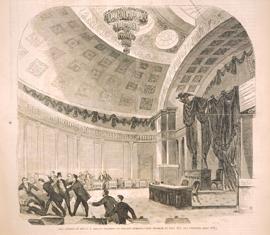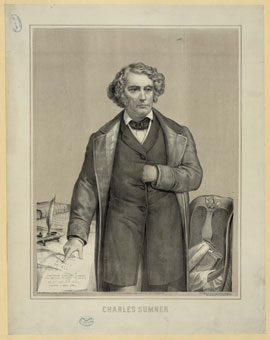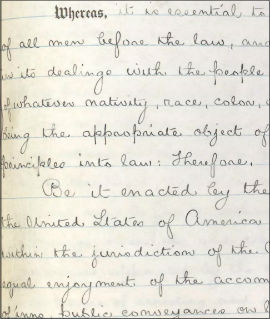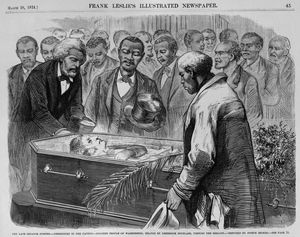I believe the newscasters name was Dickerson and he was being interviewed by Steve Colbert on his late night show about this.
Dickerson was asked whether this was the worst the country had ever seen with partisonship and he said, "NO. The Caning of Sumner almost to death on the Senate Floor was how bad it actually got right before the Civil war. Sumner was very against Slavery and this is what happened then.
begin partial quote from:
https://www.senate.gov/artandhistory/senate-stories/charles-sumner-after-the-caning.htm
Representative Preston Brooks of South Carolina attacked Sumner at his desk in the Senate Chamber, beating him with a heavy walking stick until the senator was left bleeding and unconscious on the Chamber floor.
end partial quote.
However, I feel all the people injured or that died January 6th caused directly by Trump's speech that day was much worse for the country than one man almost being beat to death with a cane before the Civil War.
Here is the full quote of this historical article:
begin quote from:
https://www.senate.gov/artandhistory/senate-stories/charles-sumner-after-the-caning.htm

Senate Stories | Charles Sumner: After the Caning
Senator Charles Sumner of Massachusetts is best remembered for his role in a dramatic and infamous event in Senate history—what has become known as the “Caning of Sumner.” Just days earlier, Sumner had delivered a fiery speech entitled “The Crime Against Kansas,” in which he railed against the institution of slavery and unleashed a stream of vitriol against the senators who defended it. In retaliation, Representative Preston Brooks of South Carolina attacked Sumner at his desk in the Senate Chamber, beating him with a heavy walking stick until the senator was left bleeding and unconscious on the Chamber floor.

U.S. Senate Collection | About this artifact
Sumner convalesced, returning only intermittently over the next three years. He resumed full-time duties in 1859 and over the next 15 years became a trailblazing legislator who left an indelible mark on the Senate and the country. As chairman of the Senate Foreign Relations Committee from 1861 to 1871, Sumner wielded great influence over the nation’s diplomacy, but his tireless efforts in the realm of abolition and civil rights were what truly defined his career.
Sumner was among the first members of Congress to argue that the Civil War had to be fought to end slavery as much as to save the Union. In fact, he said the two goals were inextricably linked. He called slavery “the main-spring of Rebellion” and insisted, “Let the National Government . . . simply throw the thing upon the flames madly kindled by itself, and the Rebellion will die at once.”1 He worked tirelessly behind the scenes to prevent moderate Republicans in Congress and in Abraham Lincoln’s administration from compromising on the question of abolishing slavery. When President Lincoln issued the Emancipation Proclamation on January 1, 1863, which freed slaves in the rebelling states, Sumner praised Lincoln’s action but quickly added that the presidential proclamation did not go far enough. Only national abolition, immune from action by the Supreme Court, could guarantee an end to the heinous institution—and that meant a constitutional amendment.

Library of Congress
To gain Senate approval of what would become the Thirteenth Amendment, Sumner collaborated with a number of antislavery activists and forged a unique alliance with members of the Women’s National Loyal League. Created by stalwart reformers Elizabeth Cady Stanton and Susan B. Anthony, the Women’s National Loyal League held its first convention in May of 1863 and began a campaign to collect one million signatures on a petition demanding a constitutional amendment for the total abolition of slavery. To receive this and other petitions, Sumner asked the Senate to create a special committee “to take into consideration all propositions . . . concerning slavery.” The Senate complied and named Sumner as chairman.2
By early 1864, the National Loyal League had collected 100,000 signatures. Never one to miss a moment of high drama, on February 9, 1864, Sumner entered the Senate Chamber accompanied by two tall African American men who carried a pair of massive steamer trunks filled with petitions. Sumner presented the petitions to the Senate, calling the signers “a mighty army, one hundred thousand strong. . . . They ask for nothing less than universal emancipation.”3 Sumner’s speech became known as “The Prayer of One Hundred Thousand.”
Sumner hoped to use his position as chairman of the new committee to promote total abolition. In February of 1864, just before delivering his “Prayer” speech, he introduced a constitutional amendment to end slavery, asking that it be referred to his Select Committee on Slavery and Freedmen, although Senate practice dictated otherwise. Judiciary Committee chairman Lyman Trumbull objected, insisting that his committee was the proper one to consider such proposals. The Senate sided with Trumbull.
Library of Congress
When the Judiciary Committee reported its version of an abolition amendment to the full Senate, Sumner thought it was not strong enough. He had insisted that any amendment must include a provision that all persons were “equal before the law,” but few senators were ready to take such a bold step. Making all persons “equal before the law,” argued one senator, might lead to dangerous consequences, such as providing voting rights to women. Instead, the committee approved more modest language that echoed the Northwest Ordinance of 1787. “Neither slavery nor involuntary servitude, except as a punishment for crime whereof the party shall have been duly convicted, shall exist within the United States.” Although the statement was less than Sumner had hoped for, he joined his colleagues in voting for passage of the Thirteenth Amendment in April of 1864.
In the years following the Civil War, Sumner recognized that abolition was only the beginning of the battle for civil rights. He used what power he could muster to protect the gains that African Americans had made in the South and urged his colleagues to approve mobilization of federal resources to do so. He emerged as a leading opponent of President Andrew Johnson’s Reconstruction policies, which Sumner and other Radical Republicans believed were designed to reinstate white supremacy in the former Confederate states. He supported impeachment and removal of the president in 1868, though the Senate came up one vote short of conviction.
Sumner’s steadfast defense of his principles often led him to oppose compromise measures. He believed that the government owed former slaves a guarantee of their suffrage rights, along with support for education and land ownership. Sumner initially opposed the Fourteenth Amendment to the Constitution, which declared that African Americans were citizens entitled to equal protection of the laws, because it did not contain a clear guarantee of voting rights. Ultimately, he cast his vote in favor of the amendment. Never shy about chastising his fellow Republicans for not going far enough, Sumner took every opportunity to place the question of equal rights before the Senate. Such radical views stirred action, but they also made enemies. “If I could cut the throats of about half a dozen senators,” confessed William Pitt Fessenden of Maine, “Sumner would be the first victim.”4

National Archives
In 1870 Sumner introduced what he considered to be his most important piece of legislation, a civil rights bill to guarantee to all citizens, regardless of color, “equal and impartial enjoyment of any accommodation, advantage, facility, or privilege.” Sumner had characterized segregation and other anti-black laws in the South as “nothing but the tail of slavery,” and he predicted his civil rights bill would be the greatest achievement of Reconstruction. “Very few measures of equal importance have ever been presented,” he proclaimed.5
Unfortunately, Sumner’s idealistic and uncompromising stance had alienated him from many of his Senate colleagues, and the bill failed. In 1871 he even lost his influential position atop the Foreign Relations Committee when he entered into a fierce public battle with President Ulysses S. Grant over plans to annex Santo Domingo. The party caucus sided with Grant and removed Sumner as chairman. Despite becoming increasingly isolated within his party, Sumner persisted and continued to introduce the civil rights bill. After suffering a heart attack in 1874, Sumner’s final thoughts remained with his bill. The dying Sumner pleaded with Frederick Douglass and others at his bedside: “Don’t let the bill fail. You must take care of [my] civil rights bill.”6 Sumner did not live to see the fate of his bill.

Library of Congress
When Sumner died on March 11, 1874, his supporters mourned him as a national leader. Thousands passed by his casket in the Capitol Rotunda, where it was placed on the same catafalque that had held President Lincoln’s casket a decade before. Thousands more lined the train route by which the senator’s body was transported north and were present upon its arrival in Massachusetts. As he lay in state in the Massachusetts State House, soldiers of the Massachusetts 54th Regiment, composed of African American soldiers who had fought in the Civil War, stood guard. The Springfield Republican lamented: “The noblest head in America has fallen, and the most accomplished and illustrious of our statesmen is no more.”7
As a final tribute to their often-difficult colleague, senators passed an amended version of Sumner’s bill, the Civil Rights Act of 1875, but again Sumner proved to be ahead of his time. The Supreme Court struck down the law as unconstitutional in 1883. It would take another 80 years for Sumner’s ideas to gain full legislative endorsement—with the Civil Rights Act of 1964.
If you seek the source of Sumner’s fame, look to the caning. To truly understand the importance of Sumner’s enduring legacy as statesman and legislator, however, you need to explore the career that came after the caning.
Notes

No comments:
Post a Comment